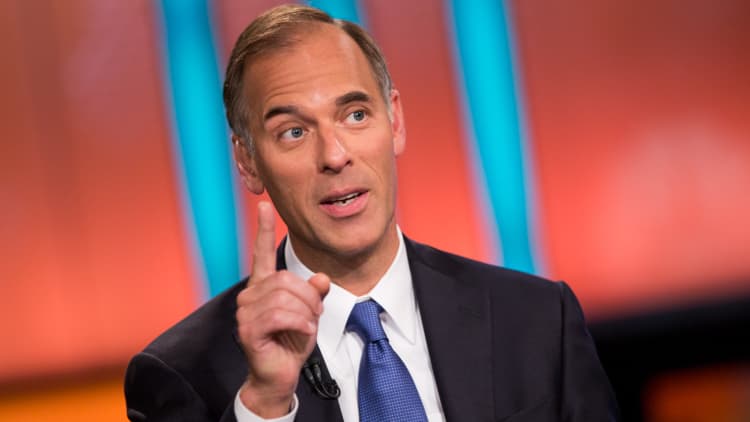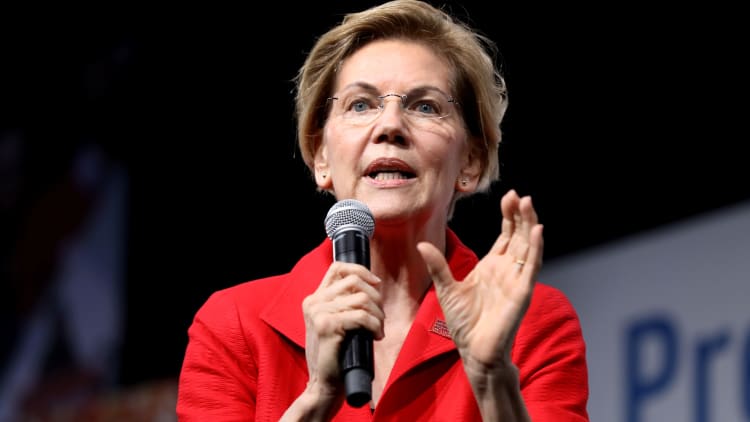
An economist who provided analysis for Sen. Elizabeth Warren's "Medicare for All" plan offered alternative ways to fund the presidential candidate's basket of progressive policy proposals on CNBC on Wednesday.
"In my mind, I don't think I would go the wealth tax way," Mark Zandi, chief economist at Moody's Analytics, said on "Squawk on the Street." "It's going to be pretty tough to execute on that.'"
Warren, a Massachusetts Democrat, has relied on her proposed 2% wealth tax on people whose net worth is more than $50 million as the funding mechanism for her many of her policy plans. Her plan to pay for Medicare for All includes a wealth tax of 6% on net worth over $1 billion, up from her previous proposal of 3%.
Zandi was among a group of economists who wrote that Warren could pay for her "Medicare for All" program "without imposing any new taxes on middle-class families."
That higher rate on billionaires would raise $1 trillion over 10 years, according to Zandi and the other economists cited in Warren's proposal. They also noted in their analysis that the calculation assumes a 15% rate of tax avoidance. It also called for taxing capital gains like income for households in the top 1%.
The economists also said that their analysis "is not an endorsement of Medicare for All or of these proposed revenue and spending options to fund it."
Zandi, who has mostly donated to Democrats including Hillary Clinton in 2015, said he agrees with people who suggest the IRS would struggle to enforce Warren's tax. Those skeptics say the ultra wealthy would find ways to evade the tax — perhaps by getting a divorce — thus reducing the amount it generates annually.
Warren's plan does include a one-time tax penalty on people with $50 million or more in assets who seek to renounce their U.S. citizenship.
Zandi said he is sympathetic with the stated goals of Warren's policy proposals, but suggested that there are better ways to fund them.
To do so, Zandi said he would "juice up" the estate tax, arguing "that seems like a really reasonable thing to do."
He also said he would look at reducing "preferential tax treatment" around capital gains, as well as letting "evaporate" the tax cuts for high-income households included in President Donald Trump's 2017 Tax Cuts and Jobs Act.
"Government is being starved. It needs more revenue," Zandi said, arguing that government revenue as a share of GDP is "as low as it's been in 50 years. It's unprecedentedly low in a full employment economy."
"We need to address the income and wealth inequalities that are getting worse," Zandi said.
Warren's proposals have drawn the ire of Wall Street and the nation's wealthy as the former Harvard professor's campaign gained traction among the Democratic electorate.
Warren is second to former Vice President Joe Biden in the RealClearPolitics average of national polls, while she narrowly leads the teeming field in an average of Iowa polls.
When evaluating the tax impact of Warren's plans, Zandi cautioned against isolating them from each other.
Instead, he said, the positions of her campaign need to be considered "in its totality."
"If you take anyone of her proposals, there's a lot of good, there's a lot of bad. We can debate it," Zandi said.
But with her plans on housing, clean energy, child care, health care and Social Security reform, "each of them have tax proposals attached to them, so all of these things will conflate with each other, have impacts on each other," Zandi said.
"Picking off one of the proposals, I think at this point, would be a mistake to try and understand what she's trying to do and whether she will be effective in doing it," Zandi said.
In the run-up to the 2016 election, Zandi and others at Moody's offered analysis of economic proposals from both Clinton and Trump, generally praising the former secretary of State while casting doubt on the efficacy of the billionaire businessman's plans.
While some aspects of have proven true, such as a growing federal deficit, Moody's prediction that Trump's presidency would cause a "lengthy recession" has not materialized.



